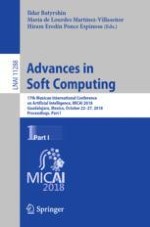2018 | OriginalPaper | Buchkapitel
Modeling Decisions for Project Scheduling Optimization Problem Based on Type-2 Fuzzy Numbers
verfasst von : Margarita Knyazeva, Alexander Bozhenyuk, Janusz Kacprzyk
Erschienen in: Advances in Soft Computing
Aktivieren Sie unsere intelligente Suche, um passende Fachinhalte oder Patente zu finden.
Wählen Sie Textabschnitte aus um mit Künstlicher Intelligenz passenden Patente zu finden. powered by
Markieren Sie Textabschnitte, um KI-gestützt weitere passende Inhalte zu finden. powered by
